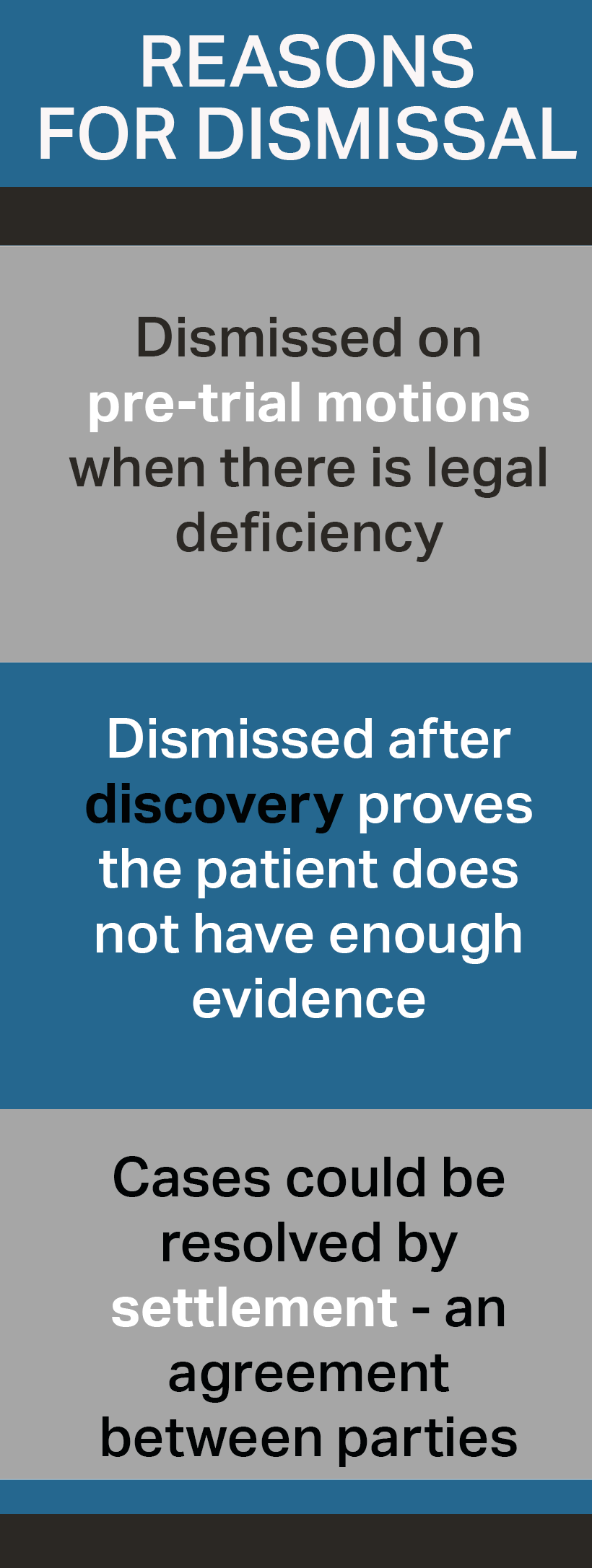Med Mal 101: Back to Basics is 12-part series produced by Friday, Eldredge & Clark. Written by the attorneys in the Medical Malpractice Group, the content is designed to give physicians and other healthcare providers information they need to know about malpractice litigation.

According to at least one study of more than 10,000 cases involving obstetric and gynecologic procedures between 2005 and 2014, approximately sixty percent of lawsuits filed against doctors were dropped, withdrawn or dismissed prior to trial. [1] Why do so many cases end before a trial takes place? [2]

First, some cases are dismissed on pre-trial motions where there is a legal deficiency with the case. For example, a case may be dismissed if it was filed after the expiration of the statute of limitations, if it is not filed in the proper jurisdiction, or if the parties are not properly served with legal process. Also, the case should be dismissed if the complaint fails to state facts, even if true, that would entitle the patient to legal relief. [3]
Second, some cases are dismissed because after discovery, it is apparent that the patient does not have evidence to support his or her claim. For example, to prove that a medical care provider has committed malpractice, there must be testimony from experts to show that the care provider's actions were below applicable standards. There must also be expert proof that the injury that occurred would not have happened anyway. If the plaintiff cannot produce such evidence prior to trial, his or her case will be dismissed because under these circumstances, there is no dispute for a jury to hear. [4]
Finally, some cases are resolved by agreement between the parties. A "settlement" occurs when both parties agree to certain terms that are mutually agreeable to all involved. This can happen early in a case, but typically occurs once full discovery has taken place so that the parties are well advised of all of the facts and circumstances surrounding the case before it is resolved. In this way, the parties are able to work out their differences prior to going to court.
There are many legal and factual considerations that may cause a case to end prior to trial. When faced with litigation, it is always best to consult your attorney who can advise you as to whether pre-trial resolution is appropriate.
The information was written by the attorneys in the Medical Malpractice Group at Friday, Eldredge & Clark, LLP. This is not a substitute for legal advice and should be considered for general guidance only. For more information or if you have further questions, please contact one of our Medical Malpractice Attorneys.
[1] L.M. Glaser et al, Trends in Malpractice Claims for Obstetric and Gynecologic Procedures, 2005 through 2014, 217 American Journal of Obstetrics and Gynecology 340 (September 2017).
[2] See Jeffrey Q. Smith & Grant R. MacQueen, Going, Going, But Not Quite Gone, 101 Judicature 26 (2017) (citing Marc Galanter & Angela Frozena, Pound Civil Justice Inst., The Continuing Decline of Civil Trials in American Courts 23 (2011)). This 2002 study found that civil cases were resolved by juries in state court less than one percent of the time. This study was focused on civil cases as a whole, rather than exclusively those dealing with medical malpractice.
[3] See, e.g. Ark. R. Civ. P. 12.
[4] See, Ark. R. Civ. P. 56.
The 12-month series will include the following topics: